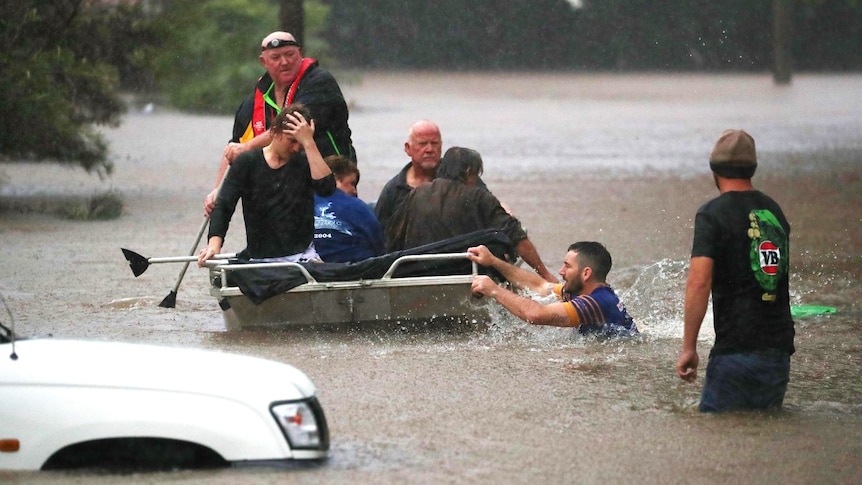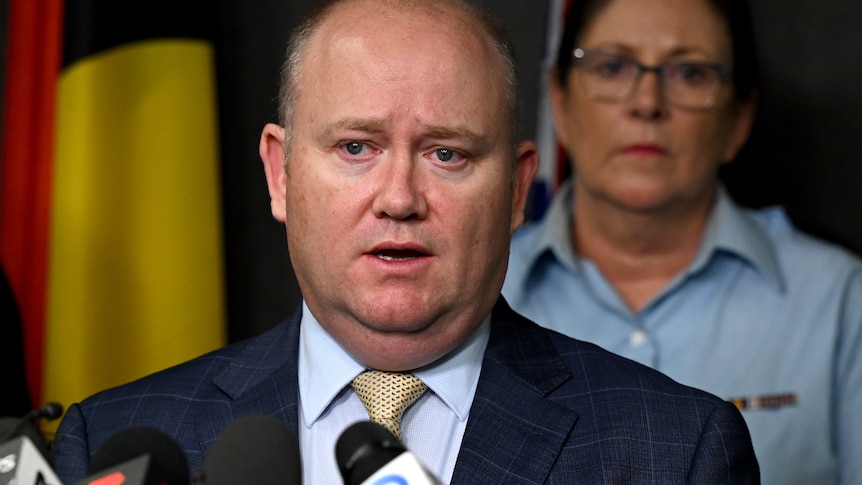A parliamentary inquiry has found the government agencies in charge of preparing for and responding to major flooding in New South Wales this year failed affected communities.
Key points:
- A NSW parliamentary committee has found lead agencies failed to warn and protect communities
- It is recommending the SES restructure to harness local knowledge, and that Resilience NSW be abolished
- The weather bureau is also being told to consider reviewing its data
Seven people died and thousands of people were displaced or cut off when floodwaters devastated the Northern Rivers region twice since late February.
Despite calls from authorities to stand down, residents took to boats and jet skis to rescue each other from rooftops, and took with them axes and other equipment to cut open roof cavities in which people were stuck.
Led by Labor’s Walt Secord, the parliamentary committee took evidence at a series of hearings across the state’s north as well as Western Sydney, where floods also became deadly.
“The committee found that the [State Emergency Service and Resilience NSW] failed to provide leadership and effective coordination in the community’s greatest time of need,” Mr Secord told parliament as he tabled the report.
The report found that information from the State Emergency Service (SES) and Bureau of Meteorology (BOM) was “incorrect and out of date”, leaving the community with “no other option but to ignore government advice and save lives”.
It made 37 recommendations, including that the SES, the state’s lead agency in a flood event, undergo a restructure to harness local knowledge and employ more salaried staff.
It urged the weather bureau to review its rain data infrastructure and flood modeling tools.
The report found the state agencies and BOM were “not prepared for, nor did they comprehend the scale” of the floods and that “some agencies were criticized for treating it as a nine to five business operation”.
Lismore resident Billy Curry was one of many in the “tinny army” who took it upon themselves to rescue people the day his home town went under.
He agreed there did not seem to be enough resources to assess and respond to the situation, and that without the impromptu volunteers “the community would have been in a lot of trouble”.
“There were scenes there where you were ducking under power lines and street lights in a boat,” he said.
“We lifted 64 older people from an elderly aged care place into a boat, so that’s something you don’t forget.”
Mr Curry said he wanted the State Emergency Service to adopt a database of volunteers who had lifesaving skills and equipment such as jet skis, who could be quickly briefed via SMS in an emergency.
“Also, there was no management of knowing who was in the water and how many people were volunteering,” Mr Curry said.
“SW [no] database of managing the demand of incidences, that definitely stood out, it was absolute chaos.”
The committee has also recommended the NSW Government consider abolishing Resilience NSW, the disaster recovery agency set up in the wake of the Black Summer bushfires, currently led by former Rural Fire Service Commissioner Shane Fitzsimmons.
The inquiry is separate to an independent report, that the government has received but not made public, which the ABC understands will also recommend dismantling Resilience NSW.
Both the SES and Resilience NSW told the ABC they would consider the findings before responding to parliament.
A spokesman for the NSW Emergency Services Minister Steph Cooke said they did not know when the report would be tabled and that the minister would not be able to comment “until the NSW Government actually receives the report and has an opportunity to review and respond”.
The report findings include:
- SES and Resilience NSW failed as lead agencies
- SES was hindered by centralization and shortage of volunteers
- SES issued out of date, inaccurate and confusing messages
- Community members had no other option but to ignore government advice and save lives
- Grants process was insensitive and compounded trauma
- NSW Government agencies lacked coordination, created confusion
- Demarcation disputes between NSW Government agencies slowed the roll-out of support
- NSW Government failed to adequately prepare effective temporary and long-term housing solutions
Recommendations for NSW Government include:
- Consider a restructure of SES to harness local knowledge, coordinate more closely with other rescue agencies, increase salaried staff and drive volunteer recruitment
- Consider abolishing Resilience NSW
- Appoint a senior police officer to lead recovery efforts
- Prioritize the rebuild of Cabbage Tree Island
- Significantly increase investment in flood mitigation and preparation
.

